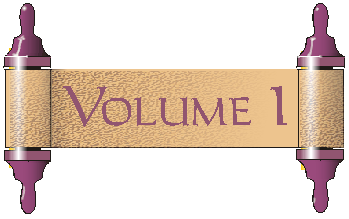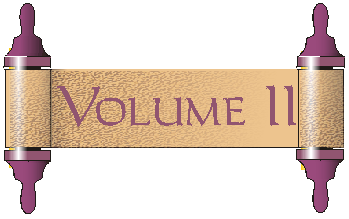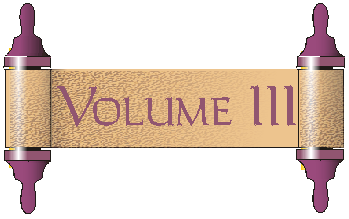



|
 |
VOLUME I |  |

Chapter 17
The house was in ruins.
The soldiers had dismantled it. They would have fired it as well, but the village elders prevailed with pledges of obedience and a substantial bribe, and they had contented themselves with demolishing the house completely then left. Only the foundations remained. According to custom no one would build for some time. Over the years, the rubble would be removed a little at a time for use elsewhere in the village. Eventually, no trace of the tragedy would be left. It would become a wasteground, then within seven years someone would build again on that spot. By that time, the soldiers who had taken part in the destruction would have left the service of the king, or have been transferred, or killed in some local uprising, a sortie after bandits or rebels, and none would care nor remember what crime had brought destruction upon the place.
But all that was in the future and Miri stood alone in the jumbled mass of stone, brick and shattered wooden beams. Already some of the rubble had been comandeered to repair a breach in the village perimeter wall which had collapsed in the last rain storm.
She and her family now lived as outlaws in the nearby hills They moved about, sometimes living in the cave, sometimes under tents. They were now swallowed up by the land of the jiins and demons, and lived like Bedouins with no permanent home.
The people in the village looked the other way when she appeared in their midst. They ignored her in the same way as they would ignore a ghostly apparition, acutely conscious the wraith was there, yet firmly convinced that they could will it away by not looking at it. Only a vague uneasiness had drawn Miri back into the village. So she returned to the one spot she knew the best, and now stood in the rubble wondering why she had come.
She turned about surveying the ruins. Naomi stood watching Miri from a distance, but as Miri’s eyes met with hers she lifted her veil to her face and walked away.
Suddenly the hair on her skin began to rise and goosebumps raised along her body. She felt a vibration in her feet, then heard a rumble which grew all around her. The ground at her feet heaved upward then dropped beneath her. The stones on the ground vibrated and bounced briefly, then the ground heaved again.
She lost her balance. The rumbling was deep and heavy and she heard cries of terror as she fell. She blacked out for a second and awoke lying on the ground. Everywhere about her were cries for help.
She ran to the house which had once abutted the House of David and ran inside. Smoke was drifting from the doorway
“Is anyone here?” she called out. She coughed as smoke filled her throat and lungs.
“Help me!” called a weak voice from the darkness. Miri squinted and saw Sarai, her neighbour lying beneath a beam of her house. Miri rushed to her side and with a great effort, lifted the beam from Sarai.
“Oh Mother!” whispered Miri, spying the terrible burn on the old woman’s arm.
“The pots on the stove-” said Sarai.
“Shhh! It’s alright!” said Miri reassuringly. She lifted the frail old woman and carried her through the black smoke and into the searing whiteness of the sun. She laid the old woman on the ground, resting her head in her lap. The old woman breath rattled erratically.
“Miri!” she gasped, “Bless you, child!”
Her breath rattled in her throat like an asthmatic cat purring and her soul departed from ther body. “What are you doing?’ called an old man hurrying to where she sat.
“Elias-” Miri began.
“Get away!” shouted Elias, pushing her roughly backward. Other villagers gathered.
“What happened?” they asked each other. “What is wrong with Sarai?”
“Elias,” said Miri gently, placing her hand on his shoulder. He shrugged her hand off.
“Haven’t you done enough?” He shouted at her, “She is dead! You have brought first the retribution of Herod upon our heads, and now the wrath of Yahweh! You and your idolatry have blackened the name of Sychar in the eyes of the Lord! You have led Sarai and the other women of the village to worship in the old gods, and now we must all pay for your pagan ways! Begone!”
“Elias-” Miri said again. She was taken aback by his vehemence.
“Begone!” shouted another. She looked up. Others took up the chant and Miri backed away from the crowd which moved to surround her. A stone struck her forehead. She had not seen it coming nor who had thrown it. She shakily touched her fingers to the cut and stared in shock at the blood. She backed into a wall and slid slowly along it her hands feeling her way as her eyes faced those of the crowd. The crowd was now some menacing creature stalking her and she moved carefully so as not to provoke it. It had drawn blood and she knew their anger was turned towards her. She saw an opening and ran, her legs empowered by fear. Stones fell about her. Luckily the villagers’ aims were not good, but each stone thudding into the ground beside her added energy to her muscles and she ran as she had never run before. The villagers ran after her. One or two stones hit her back, but she felt no pain, only fear of being trapped.
The crowd would no longer be satisfied with her banishment, they wanted her blood. They knew only the blood of the princess of Astarte would satisfy Yahweh. Ahead of her was the open village gate and she could see freedom beyond. As she ran, her pursuers called out to the gatekeeper, “Close the gate! Close the Gate! Stop her! Stop her!” but the gatekeeper did not appear to understand their calls. He walked forward hesitantly and lowered the point of his lance.
“Oh Mother!” cried Miri and slid to a halt in a cloud of dust. “Close the gate!” yelled someone from the crowd. The gatekeeper turned and ordered two men closer to the gate to close the gate.
The pack behind Miri slowed and its members fanned out. Miri crouched, expecting an onslaught, but it never came. The ground groaned beneath her and trembled. Everyone shouted in fear. One side of the gate tower cracked and slumped downward. The men closing the gate cried out and the gate jammed, wedged against the ground. They let go of the gate and ran for their lives. Seeing an opportunity, Miri dashed for the opening.
The others were frozen by shock, and no one chased after her. Miri raced down the road. The earth shook again and behind her, the walls of the village collapsed and the gate tower tumbled to the earth, blocking the entrance to the village. Miri saw none of this. She ran, conscious only of the burning fire in her straining lungs and the ache in her side. Her feet pounded on the dirt road. She ran. Slower. And slower.
Eventually she stopped holding her side, panting, and turned to look behind her. The village was out of her line of sight, behind the mountain. She leaned against a large boulder and stared back down the roadway as she caught her breath. After a few moments she was sure she had not been followed, and sat down to rest. She rubbed her aching calves, and her breathing still laboured.
Her world seemed to have turned inside out. Everything she had known as a child, the peace and serenity of the village, the circle of women at the shrine to the Great Mother, the huge protecting arms of David, the innocence of childhood, even the very ground beneath her feet, all had come apart.
Her head sank to her knees and she began to sob.
![]()
The camp was a shambles. Boulders had tumbled down the mountainside. Some had passed through the camp. Some had not.
The animals wandered untended through the wreckage of the tents. A stranger in fine robes, Egyptian linen, Tyrian silk and Damascene embroidered cloth, stood in the midst of the tattered remnants of the camp, seemingly untouched by the mayhem about him. He held Yohanna in his arms, comforting her. As Miri came nearer, she spied Eliazar in Yohanna’s arms. Thankfully, his little arm moved to embrace his mother. As she approached, Miri called out.
“Yohanna!”
“Miri!” she cried. “Thank the Great Mother you’re alright!”
Martha and Sister Miriam’s faces appeared from what Miriam had thought was a bundle of rags. Their faces were dirty, tear-streaked and bloodied and Miri reacted with alarm.
“We’re not hurt, Miri!” said Martha tearfully, “But Maacah and Manasseh were killed! They were crushed by boulders passing through their tent!”
“Miriam!” The stranger spoke to her. “I am Yusef, David’s father! I came as soon as I heard of David’s troubles, but I fear I am too late!”
“No!” said Miri, “You have come just in time!”
She told them of the occurences in the village.
“They will hunt us down!” said Yohanna after she heard the story. “They will not be happy until we are dead! Whatever happens will be blamed on our presence! We must leave!”
“Where will we go?” asked Martha plaintively.
“I have an estate in Bethany.” answered Yusef. “You can all stay there, but you will have to change your life and learn to be cultivators of the soil instead of shepherds. Can you manage a household on your ownas well as an estate? Shall I find you a husband to help you?”
“No!” snapped Yohanna. She recovered immediately. “That is very honourable of you Yusef, but I could not bear to share my every day with another man!”
Yusef seemed relieved. “Very well, I shall attend to your needs there until you are settled. I have business to attend in Yerushalayim, and shall call upon you at your convenience.”
“You will always be welcome at my door, Yusef. Eliazar will need your influence now his own father is no longer with us.” Her face darkened.
Miri took Eliazar from Yohanna’s arms. The baby smiled at her and she babybooed at him and he chuckled happily.
“Here!” she said to Yusef, and held Eliazar out to him.
Yusef took the baby gingerly, but his reserve melted away under the sunshine of the baby boy’s radiant innocence, and he smiled contentedly. His eyes filled with bittersweet tears.
“He is very much like his father!” he said wistfully.
Yohanna smiled and Miri nodded.
“He has your eyes!” Miri said to Yusef.
Yusef beamed. He bounced the baby and danced a little dance and the baby gooed and gahed.
Yohanna touched Miri.
“You know more than you know,” she said with a smile. “Thank you, Miri!”
Yohanna moved to comfort her two daughters. Martha insisted she was fine and bustled off to clean herself and Yohanna sat down and cradled Sister Miriam.
“Why, Mama?” Sister Miriam asked, “Why does God hate us?”
“He doesn’t hate us, Miriam,” Yohanna replied softly, “Sometimes he just leaves us on our own. How else would we learn to cope with life?”
“Why doesn’t he help us? I prayed and prayed for his help, but he didn’t save us! He took father. He took Maacah and Manasseh! Why, Mama? Why?”
Miri wandered about the camp with a mind to salvaging as much as she could but her heart sank and she found herself just standing and staring about her.
Then, the breeze touched her cheek and pushed the hair away from her face. The arms of the wind embraced her body and carried the words of Yusef to Eliazar.
“May the Lord Bless thee and keep thee. May the Lord turn his face to shine upon thee, and may the Grace of God fill thee. May the Lord place his countenance upon thine, and bring thee peace!”
The words of Yusef’s prayer calmed her, and she took a deep breath. Somehow, the world was as it should be. What came to pass came to pass. Yusef hummed a tune as he danced with the baby Eliazar. Sister Miriam and Martha begun to clap in time, and soon all were dancing with Yusef, and he sang. Miri’s heart felt it would burst. She danced with Yusef and he sang a song to his tiny grandchild:
“By the rivers of Babylon, there we sat down
There we sat down and wept!
Yea, we wept! We wept!
We wept when we remembered Zion.
We wept when we remembered Zion.
We hung our harps upon the willows
On the banks of the river of Babylon
And we wept when we remembered Zion.
For there on the rivers of Babylon,
They who carried us away to slavery
To slavery, to slavery
They who carried us away to slavery
Required of us to sing a song
Sing a song, sing a song!
And they who lay waste to our land
Laid waste to our land, laid waste to our land,
And they who lay waste to our land
Required of us much mirth and merriment.
Mirth and Merriment, mirth and merriment!
they who lay waste to our land
Required of us mirth and merriment.
And they asked us to sing them a song!
Sing us one of the songs of Zion!
Sing us one of the songs of Zion!
Sing us one of the songs of Zion!
How shall we, strangers in a strange land
sing a Song of The Lord Our God
The Lord Our God, The Lord Our God
How shall we sing of the Lord Our God?
And this is what we sang:
Lest I forget thee, O Yerushalayim
May my right hand lose her cunning!
Lest I forget thee, O Yerushalayim
May my tongue cleave to the roof of my mouth!
If I prefer not Yerushalayim over my greatest joy
May the Lord strike me as I dance!
May the Lord strike me as I dance!
May the Lord strike me as I dance!”
Yusef stopped, panting from exertion. He smiled at the family around him, then his face turned serious, and he spoke.
“Forgive me, for I have neglected you for too long! I have attended to my business and left no time for what is most important to us all! I realized too late that no man ever said on his deathbed, ‘I should have spent more time toiling in the fields!’ No man has ever said as he expired, ‘I should have tended more interest to my office!’
The Lord has given me a chance to redeem myself. You shall not lack for my attention to you for you are the family of my first born. It would do me great honour if you were to consider yourselves a part of my household! You shall be as my own children! All of you!”
Sister Miriam and Martha clapped excitedly. Yusef wrapped his free hand around Yohanna. “Forgive me, daughter!”
She hugged him back.
“There is nothing to forgive, Yusef! There is nothing to forgive!”
The next day, they had collected their belongings and lifted their tents again. Salome came to visit, she brought some loaves and dates.
“I thought you might be able to use these!” she said simply.
“Thank you.” Miri sat down on a boulder and Salome sat beside her. Miri stared off into the distance. “We are going to Bethany, east of Yerushalayim.”
“To stay?” asked Salome in dismay, “O Miri, what shall I do without you?”
Miri said nothing.
“Elias has made life miserable for the women of our coven. Esther already has been banned from coming. Her husband locks her in a small room while the blood is upon her. It’s awful!”
“We need you and Yohanna to keep the Yahwists from destroying the old ways! There are dark times ahead!”
“Yes!” replied Miri, “Yes there are!” She faced Salome and held her hands. “But you must hold on to the Goddess within your heart and never let go! If they persecute you for this, you must do as they say, but remember, she will know when your lips pay homage to others, the words from your heart are intended for her!”
Salome burst into tears, and they embraced. “I’m not as strong as you are, Miri! Please forgive me! I’m going to miss you so much!” Tears dripped down Miri’s cheeks and mingled with the salt tears of Salome. Soon, Salome recovered enough to kiss everyone else goodbye, and they all walked part way back down the path to the village. When she left them, Salome looked back often and waved each time. The women finally turned their faces back to the camp and walked back up the hill.
Within a day, Yusef had hired a caravan to carry the family’s belongings. They even loaded the bodies of Manasseh and Maacah onto donkeys to be taken back to the River Jordan from whence they had come, there to be buried. The girls marvelled at the riches of Yusef. An armed escort arrived in full battle gear to escort them to Bethany. They prepared to leave. Yohanna was ensconced with Eliazar in beautiful covered sedan, the girls each mounted on horseback.
“Can you imagine!” said Martha excitedly, “A real horse!”
Miri was quiet. She was unnerved by her change in fortune. As if in answer to her questioning of her change in direction. Mermaat appeared from nowhere, standing at the head of Miri’s horse. Over her shoulder was a large pack.
“Well, princess,” she said, “You are leaving!”
Miri was embarrassed by Mermaat’s presence. “Mermaat! I am so sorry! In all the excitement, I forgot about you!”
“Such goings on!” said Mermaat, “Yes, I can see how it would slip your mind! But I have not forgotten you little Mistress! I heard of your escape from the village! Such a terrible thing!”
“Manasseh and Maacah are dead!”
“I know, child!” Mermaat moved to Miri’s side and grasped her hand. “You are not safe in this country! The warlords and the barbarians are taking control of the old ways! You must come with me to Egypt! You will be safe there!”
“Egypt!” gasped Miri.
“To Egypt!” whispered Mermaat emphatically.
Miri’s heart beat wildly. Never in all her imaginings had she thought of travelling to Egypt.
“I cannot leave Yohanna!” she said suddenly. “Or my sisters!”
Mermaat looked directly and closely into Miri’s eyes, transfixing the young woman. “You must come! After you have served the time you need to serve in the Two Lands, then you will return to your sisters, but there are things you must learn you can learn nowhere else!”
“Come with us to Bethany, Mermaat!” whispered Miri, “There I will tell Yohanna and the others of your offer and I will consider whether I shall travel with you to the land of your birth!”
“You go on your way, Miriam!” replied Mermaat, I shall arrive in my own way. You will need time to yourself!”
![]()

